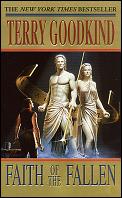
| Series: | Sword of Truth #6 |
| Publisher: | Tor |
| Copyright: | July 2000 |
| Printing: | August 2001 |
| ISBN: | 0-812-57639-X |
| Format: | Mass market |
| Pages: | 785 |
Since this is the first time that I've reviewed a Terry Goodkind novel, I should probably say something first about why I've actually read this many of his books.
Terry Goodkind is a bad writer. I think this is pretty much unquestionable. His sentence structure is simple and rarely varies, the narration belabors descriptions and emotions endlessly, the characters are simplified archetypes, the dialog is repetitive, the politics are odious, and the reader is expected to want everything explained to them in great detail. The Sword of Truth series is a typical set of fantasy bricks involving destined and powerful characters saving the world, and the main character manages to stumble through to victory by being the IQ 90 man in the land of morons.
So why on earth am I still reading this series? It definitely falls into the category of guilty pleasure, but there are a couple of things in particular that I like.
First, the way that Goodkind writes his characters makes them somehow feel alive despite being walking archetypes. He seems to be using a technique similar to what I often do with my own, namely try try to get into their head as far as possible and then watch them react to the world that's been set up. It's hard to put a finger on why this feels different than most novels I read, but I get a sense of immediacy and raw reaction from his characters that makes me interested in their fate no matter how dumb they are or how poor the writing is.
Second, Goodkind has an enthusiasm for telling the typical fantasy stories that, while raw and unpolished, comes across very clearly in his writing. It feels like he's in love with the feel of a mythic world, gets a thrill out of writing every scene, and treats each archetype like it's the first time he's ever gotten to think about it. The writing has very little sophistication and retreads themes that have been handled many times before, but Goodkind has so much passion for the storytelling and excitement for the story that I can't help but smile.
So, I'm still reading. Unfortunately, Faith of the Fallen is the worst book of the series.
Goodkind has been tossing in naive bits of right-wing US "libertarian" politics for a while now, and I've been ignoring them (I have a very well-trained ability to read straight past right-wing propaganda). Previously, he got past it and got on with a story with more traditional fantasy villains. However, there is no traditional villain in this book; instead, the villain is the stereotype of a political system. As you can imagine, in Goodkind's hands this is a slow-motion train wreck.
The evil political system is some sort of bizarre twisted distortion of Christian socialism, based on the idea of expected total self-sacrifice to help others, a religion that considers man horribly evil and worthy only of devoting life to helping the needy, and needy freeloaders who demand everything be provided for them. This political environment isn't even remotely believable, particularly given that it has a mysteriously total lack of a black market (until Richard introduces one single-handedly, of course) despite political paperwork making it impossible for anyone to do anything. On top of that, the character put into the story to represent everything bad about this political system (not that there's anything good) has parents who are such extreme stereotypes that they'd fit right into an Ayn Rand novel.
This book reads like an objectivist rant against the pure evil of welfare, original sin, and charity for the poor. I'm not sure if Goodkind is objectivist, but if so I think he's working from the Cliff Notes version since Faith of the Fallen demonstrates no understanding of anything of substance about either politics or human behavior. Not even Ayn Rand levels.
Even apart from the politics, the first 400 pages drag on and on, with very little happening and lots of repetitive description. When I got to the end, though, I couldn't put it down despite the ridiculous politics; Goodkind does tug the emotional strings of archetypes quite well (at least for me). I wouldn't recommend this book under any circumstances, and I think it's going off in a direction that's even worse than the beginning of the series, but there's still something to Goodkind's writing that I like and he does the unsubtle "all the good guys win" ending very well. I'd like to think that I won't get the next book... but I fear eventually I probably will.
Please don't think I agree with it, though, and don't read it just because I do.
Followed by The Pillars of Creation.
Reviewed: 2004-10-13